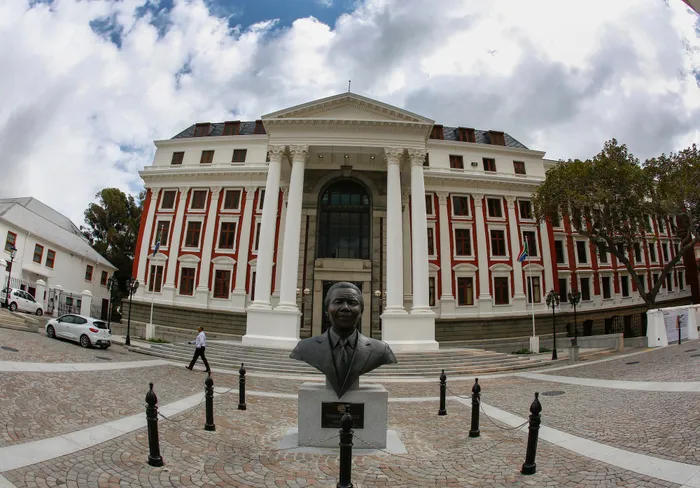Debate intensifies as Parliament considers apartheid statues committee

EFF leader Julius Malema has tabled a motion that apartheid statues be removed from public places, but this is roundly rejected by other parties except the MK Party.
Image: Nic Bothma / EPA
Parliament will decide next month whether to form an ad hoc committee to look into apartheid statues.
This comes after the debate that was sponsored by EFF leader Julius Malema in the National Assembly on Friday.
Malema’s proposal on the removal of apartheid statues in public places was roundly rejected by many parties that argued that they served as teachable symbols.
Speaking during the debate, EFF Chief Whip Nontando Nolutshungu said the unresolved question of colonial memory and its poisonous symbols stood unchallenged.
“They are not neutral symbols of history. They are monuments of colonialism and material reminders that although the political regime of apartheid has been formally defeated, the ideological, cultural, and economic structures of conquest remain intact,” Nolutshungu said.
She also said the statues were celebrated as symbols of the conquest of Africans.
“That is why they were placed in city centres, in front of Parliament on the highest hills, so that every African child growing up under colonialism would look up and see his or her oppressor portrayed as a hero.”
Nolutshungu said that while some will argue that the statues were part of the country’s history, they were not history.
“They are wounds left open. They are symbols that continue to tell us we are conquered, that we are inferior, and that we are tolerated.”
Nolutshungu said the apartheid statues of humiliation should be replaced.
“Only then can we walk through our cities and feel pride and not shame,” she said.
ANC MP Mluleki Dlelanga said his party recognised that South Africa represented colonisation of a special type where both the coloniser and the colonised shared the same photographic space.
“This unique coalition demands that our needs be addressed under political action between the oppressed majority while resolving the national treatment arising from the colonial relations,” Dlelanga said.
He also said their alternative was building a democratic national identity.
“Our approach recognises the difference between removal and repositioning,” he said. “This is not about punishing the past. It's about creating a future where all South Africans can see themselves respected in our public space.”
MK Party MP Mzikayise Ntshingila said the statues and memorials were not neutral objects.
“They are daily reminders of oppression. They perpetuate a mental harm of apartheid by keeping the perpetrators of crime against humanity in stone and marble on the very soil from which they stripped our people's missionary feeling. They are daily reminders of oppression. This House itself cannot let the majority walk past monuments,” Ntshingila said.
He said the removal of the statues must be accompanied by celebration and the elevation of African heritage.
DA MP Willie Aucamp said the Constitution not only recognised injustices, but honoured those who fought for freedom and equality.
Aucamp said his party could not support the EFF motion,, not because they denied the painful history or being blind to the injustices of apartheid.
“We oppose it because it is an unnecessary, divisive and costly distraction from the real challenges facing South Africa today. Statues and memorials are not mere pieces of stone and bronze,” he said.
“They are physical markers of history, sometimes painful, sometimes glorious, but always a reminder of where we have come from. The very presence of apartheid-era memorials does not glorify apartheid. Rather, it offers us a mirror into our past and a reminder of how far we have come,” he said.
The National Assembly will decide on whether to remove the apartheid statues at its next meeting scheduled after the constituency period.
mayibongwe.maqhina@inl.co.za
Related Topics: